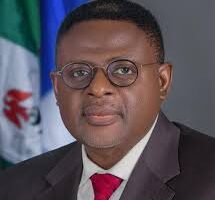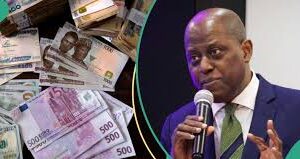Recently, Deputy Speaker of the House of Representatives, Hon Idris Wase at a meeting with the All Progressives Congress (APC) North Central Zonal Executive Committee in Abuja lamented the backwardness of the zone, in terms of infrastructure and government appointments. JOSHUA EGBDOD writes
The clarion call
Concerned by the status of the zone in the scheme of things in Nigeria, the deputy speaker of the House of Representatives, Wase, called on stakeholders in the North-Central region to work together to improve on the infrastructural status of the zone. According to him, there was need for the people of the region to join hands and work and ensure the region gets what it deserves.
Personal efforts on the available facts
Wase said: “I have demanded for federal character for the past eight years. And I will not mince words, in terms of infrastructural needs, we are far behind.
“I am the deputy speaker for Nigeria but I have my own constituency, which is this particular zone. In terms of distribution of appointments, we are far behind. And the only way we can change the narrative is by coming together. We must come together as a family to ensure we carry ourselves along and pursue one common cause of a better zone and country.”
The noncombatant option
Wase, who is opposed to any form of combative approach to demanding the rights of the people of the zone, preached a peaceful approach. He said it won’t be necessary for the region to agitate for its rights as have been the case with others, stressing that the constitution provides for equitable distribution of the national resources.
“We are not going to agitate, but to announce and ensure that we push for good representation. They say to whom much is given, much is expected. And that is why we have to work together, all the governors and lawmakers, to ensure we earn for ourselves what we deserve,” he said.
He also expressed optimism that the APC will continue to grow from strength to strength in the region and across the country.
Liaison with the ruling party
Leaders are chosen on the platform of political parties, and as it is today, the APC is in charge of power at the centre. The deputy speaker, therefore, promised an improved working relationship between the lawmakers and the party, as well as their constituents.
“I want to say that I pledge that I will not let you down; I will do my best to ensure that we bring the needed changes in terms of how we conduct ourselves at the National Assembly in relationship with our party and with our constituents so that the party will be stronger and grow from strength to strength”, he said.
Statement of fact?
“Yes”, a member of the house from one of the states in the North Central geo-political zone, who did not want to be named in print, said in reaction to Wase’s assertion. The lawmaker noted that the initial move, prior to inauguration of the 9th assembly of the house, was not for the deputy speaker slot it eventually got.
The legislator recalled that they (then some members-elect) from the zone insisted on getting the speakership on the basis of “equity, fairness and balance, which are constitutional requirements under the federal character arrangement. But you see, in politics, anything can happen, so we are here today, given the deputy speakership, even with the massive support the party (APC) got from us in the general elections (2019)”.
Going forward
On what members would do going forward, Wase said they (members of the National Assembly from the zone) “will collaborate not only with the national body of the party; (the APC) but with the various state governments to ensure that we succeed in all our endeavours”.
….implications of the new Reps standing orders
However, away from the issues raised by the deputy speaker was the new standing orders that the house would be resuming to apply from September 17, 2019, when it is expected to be back in session from the its ongoing annual recess.
The house at last Thursday’s plenary in its committee of the whole, presided over by Speaker Femi Gbajabiamila, adopted some proposed amendments as recommended by the Hon Ihonvbere Julius-led review committee.
Open balloting
Away from age-long practice of open-secret voting system in the election of presiding officers of the house, though not without some initial resistance, the lower chamber of the National Assembly, approved for itself the use of a wholly open ballot system for the election of its presiding officers.
Objection raised
The clause, which was simply put that members shall indicate how they wanted to vote on the day of inauguration, was challenged by Hon Nicholas Osai, who in his argument described the proposal as a move to “donate the powers of the house to regulate itself to the bureaucracy of the National Assembly”. He noted that since the proposal was ambiguous, it was safer for the house to retain the existing practice of open-secret balloting.
The speaker in his intervention, however, opted for an amendment to clause, to make it clearer instead of retaining the existing one as suggested by Osai. “Members shall name clearly, in the open, the candidate of their choice”, was later settled for through majority of voice votes, and of course on the basis of political party affiliations, as the APC members had their way.
With the development, members would be required to therefore, clearly state and make open, candidates of their choice for the presiding officers on the day of inauguration of a new assembly of the house.
Senate, Reps simultaneous inauguration
Also, rather than the practice of having the Clerk to the National Assembly completing inauguration of the Senate, before moving to the House of Representatives to do same, the approved amendment has given powers to Deputy Clerk of the National Assembly to simultaneously inaugurate the house, while such process lasts in the Senate, at the date and time stated in the presidential proclamation for such inauguration.
According to the review committee, the move would save time, instead of having only the CNA carrying out inauguration of both chambers while one had to wait for hours.
Reciting the National Pledge
Added to the preliminaries of each day’s plenary of the house now is also the recitation of Nigeria’s National Pledge by members. This is expected to follow immediately after the day’s prayer, and before the commencement of real legislative business of the day, among other fresh developments.
With all these in place, and the standing and special committees fully constituted, the business of the House, it is believed would be on full course as members resume on September 17.



